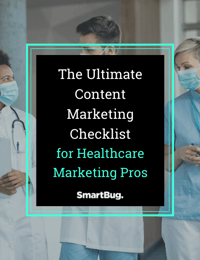
5 Inbound Marketing Opportunities Every Healthcare Marketer Should Be Going After
June 8, 2015
By Rachel Moore
While the healthcare industry is adding jobs at an astounding rate, the industry's average budgets for marketing have gone down since 2012. This doesn't signal a declining importance of marketing - on the contrary: it means marketers are finding better, more efficient ways to deliver better messages at a lower cost.
Inbound marketing delivers leads at a lower cost for companies of all sizes (source: HubSpot, 2014-2015 State of Inbound Marketing), so it makes sense that healthcare marketers should turn further towards the opportunities inbound presents for generating more traffic, leads, and customers. Here are 5 opportunities healthcare marketers can use to fuel their inbound efforts
Regulatory changes
Meaningful Use Stage One, Two, and (coming soon) Three. ICD10. PQRS. Every year, it seems like the government releases a new regulation or program that affects the world of healthcare. For practitioners and many healthcare IT companies, each of these regulations brings changes to standard business practices, product redesigns, and additional support that must be added or taken away. As a savvy healthcare marketer, it's your responsibility to not only be aware of these regulatory issues, but to know what the questions are that your persona may have. Keep an ear to the ground for those issues via governmental bulletins, news channels, and social media monitoring, then respond to those questions via your content.
Industry Jargon
The world of healthcare is full of acronyms, technical terms, and industry jargon. And if you're trying to reach physicians, practitioners, or pretty much anyone other than consumers, you need to it! If you're creating a healthcare marketing strategy you hope resonates with physicians, then it's essential that your strategy looks, feels, sounds, and is credible: a feat more easily accomplished when you're speaking the same language as your prospects.
Persona-specific marketing
You've heard it before and you'll hear it again: personas are everything when it comes to effective marketing. It's your role as a healthcare marketer to deliver the right content to the right users - and nowhere is that more important than in healthcare, where the ramifications can not only impact someone's online experience, but their health, as well.
Say, for example, you run a website that allows patients to rate their physicians and make appointments online. One of your personas may be the physicians themselves, while another may be patients looking to find a new physician or make an appointment. You wouldn't want to send a message to the patients saying "join our company and you can create a profile that only shows your best reviews," just like you wouldn't want to send a message to the physicians saying "try our website to make appointments with any doctor, any time."
Smart Content
Smart content allows you to customize the message users see based on information you have about who they are and what they're interested in. Ever logged into Amazon.com to see a list of items you may be interested in based off your previous purchases? That's smart content.
This same concept can be utilized by healthcare marketers to deliver helpful, educational content to users. While you can use information obtained via other forms on your website, one of the easiest (and non-creepy) ways deliver a smart content experience is via IP address. Do you know a website visitor is logging in from a specific geographic area - like, say, Miami, Florida? Then show them content tailored to issues specific to them - like, for example, the importance of wearing sunscreen in preventing skin cancer.
Timely content
In the first few months of 2015, the state of California experienced an outbreak of the highly contagous Measles virus. While the virus's spread was ultimately quelled, it brought to the forefront multiple healthcare issues such as vaccination safety, vaccines and autism, measles immunity, and beyond. While these issues existed prior to the measles scare, its outbreak brought them back into the public eye and highlighted the need for adequate, thorough, and educational content to answer questions and calm fears.
Healthcare marketers should make it a part of their job to stay on top of news and events related to their business, then respond with follow-up content when appropriate.
BUT: Don't forget about HIPAA!
If you work with what HIPAA (the Health Information Portability and Accountability Act) considers a "covered entity," you may be considered a "business associate" and thus held accountable to the same types of rules and regulations surrounding the health information privacy as doctors, nurses, and insurance companies. In a nutshell, this means that you cannot use what is considered personal health information anywhere in your marketing - even if it's just to guide your smart content deployment strategy. For a review of this HIPAA rules and regulations that affect business associates and covered entities, check out this page from the U.S. Department of Health and Human Services.
Healthcare marketers can and should be using inbound strategies to achieve their traffic, lead, and customer goals. What opportunities have you taken advantage of to fuel your inbound efforts? Let us know by tweeting us at @smartbugmedia.

About the author
Rachel Moore was formerly a Senior Consultant and Team Leader at SmartBug Media. A HubSpot alumna, Rachel uses her 7+ years of experience as a marketer and neuroscientist to help clients develop innovative strategies to achieve and exceed their business goals. Read more articles by Rachel Moore.







